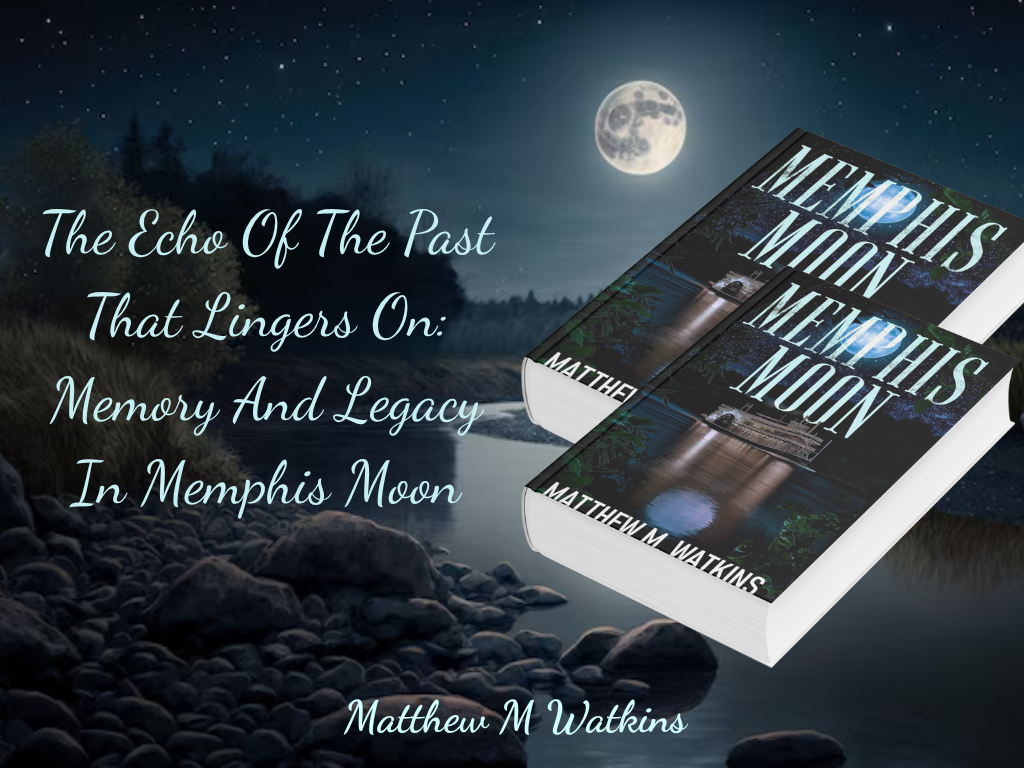Some stories don’t end when the last page is turned; they linger, like echoes in the soul. Matthew M. Watkins Memphis Moon is one of those stories. Beneath its tapestry of love, loss, and redemption runs a quieter, more enduring thread, the idea that memory is the only true form of immortality, and legacy is the way the past keeps speaking through us.
From its very first pages, Memphis Moon is shaped by memory. The novel begins not in the 19th century, but in the present, with the discovery of a diary sealed behind a wall in a Greenwich Village apartment. It’s a striking image: the words of a woman long gone, hidden in plaster and dust, waiting to be found. That diary is more than an artifact; it’s a voice. A testament. A bridge between centuries.
Watkins uses that discovery as the emotional core of his novel. The diary belongs to Virginia “Ginnie” Bethel Moon, a woman of defiance and tenderness, whose courage during the Civil War has been largely forgotten by history. Through her words, a modern writer, and by extension, the reader, is invited into her world. What follows is not merely a story of war and love, but a meditation on how lives, once lived, can continue to shape those who come after.
In the press release and featured article accompanying the novel, Watkins explained that Memphis Moon was inspired by his fascination with “the unseen footprints of those who came before us.” That phrase captures the entire spirit of the book. His storytelling is driven by a belief that memory is not static; it moves, evolves, and resurfaces in unexpected ways. The past, for Watkins, is not gone; it’s simply waiting to be rediscovered.
That belief animates every relationship in Memphis Moon. Caleb Dawkins, still mourning his father, carries his loss as both burden and inheritance. Ginnie Moon, in her diary entries, wrestles with her own memories of love, betrayal, faith, and war, using her writing to preserve not only what she saw but who she was. Even Lottie Moon, through her missionary work and enduring compassion, becomes a living reminder that legacy is not about fame, but about kindness carried forward.
The modern writer who uncovers Ginnie’s diary becomes the vessel for that inheritance. As she goes through the diary, she feels as if she is being pulled into the past, into Ginnie’s struggles and doubts. Watkins uses his writing to make the reader understand that remembrance is not passive. It’s participatory. To remember someone is to help keep them alive. In this way, Watkins’ Memphis Moon becomes a form of resurrection. It is not only about the memory of the people that went through all those ordeals, but how they went through it, how they clung on to life, and how they weren’t any different from the average person of today. His way of remembrance is practical, deliberate, and filled with moments of silence where remembrance feels sacred.
Watkins’s vision of legacy is equally powerful. For him, legacy isn’t about monuments or lineage. It’s about empathy, the ability to feel across time. The rediscovered diary in Memphis Moon is more than an object from the past; it’s a conduit for compassion. When the modern writer connects with Ginnie’s thoughts, she inherits more than her story; she inherits her strength, her wisdom, her defiance. Watkins suggests that this is how history truly endures: not through preservation alone, but through emotional continuity.
The author’s restraint makes this theme all the more poignant. He doesn’t glorify the past or burden it with nostalgia. Instead, he allows memory to be fragile, flawed, and human. Some things are forgotten, others misremembered, but that, too, is part of the legacy. What matters is not perfect recall, but the effort to remember at all.
By the novel’s end, readers understand that the real gift of Memphis Moon is not closure but connection. Ginnie’s words, Caleb’s choices, and the unnamed writer’s discovery all form a chain of empathy, a lineage of feeling that transcends death and time. Through them, Watkins reminds us that stories are not simply told; they are inherited.
And that may be his most profound message: that the act of remembering is itself an act of love. Memory, in Watkins’s world, is not a weight to carry; it’s a light to pass on.
In Memphis Moon, that light travels through centuries, illuminating faces we’ll never meet but somehow already know. It reminds us that no life truly vanishes as long as someone still cares to hear its story.

